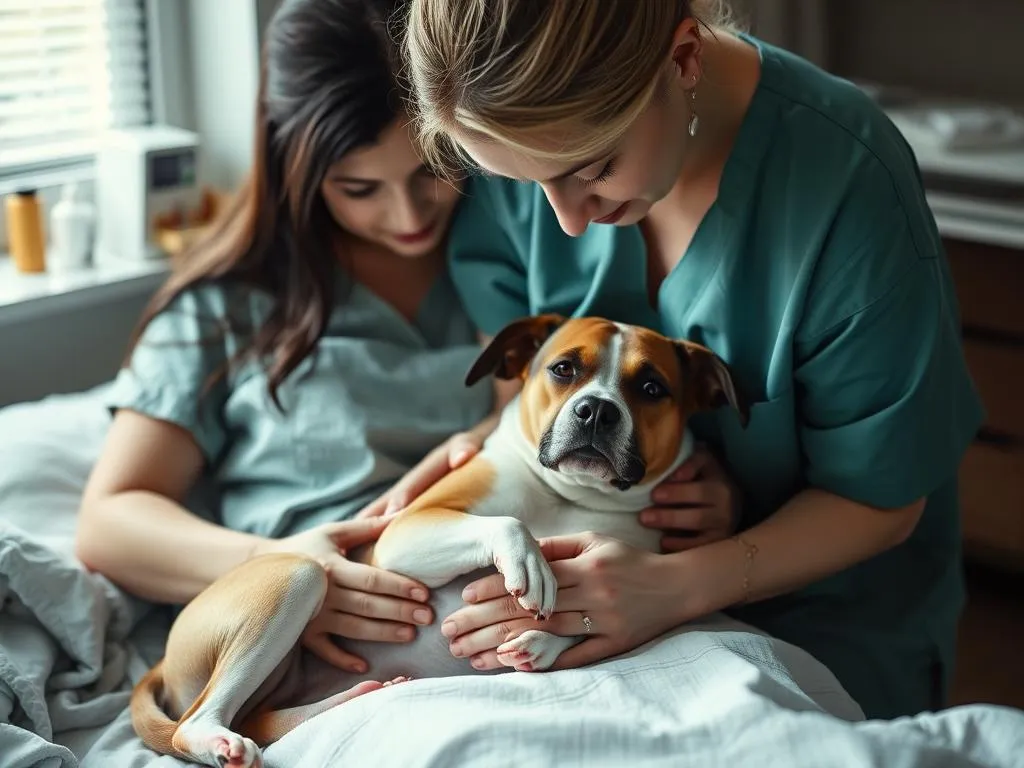
Introduction
Postpartum care for mother dogs is essential to ensure their well-being and the health of their puppies. Understanding the postpartum period—the time after a dog gives birth—is crucial for dog owners. This phase is not just about the physical recovery of the mother, but it also significantly impacts the development and health of the newborn puppies. This article will explore the various aspects of postpartum care, including monitoring the mother’s health, nutritional needs, behavioral considerations, and long-term care for both the mother and her puppies.
Understanding the Postpartum Period
Definition and Duration
The postpartum period refers to the timeframe following the birth of puppies, typically lasting around six to eight weeks. During this time, the mother undergoes numerous physical and emotional changes as her body recovers from the rigors of pregnancy and childbirth.
Physical and Emotional Changes
After giving birth, mother dogs experience a range of physical changes. Hormonal fluctuations occur as the body transitions from pregnancy to lactation. The mother may lose weight as she begins to shed the extra pounds gained during pregnancy, and her body will gradually heal from the birthing process.
Emotionally, many mother dogs display heightened maternal instincts, which can manifest as protective behaviors towards their puppies. However, some may experience anxiety or stress, especially if they are first-time mothers. Understanding these changes is vital for providing the appropriate support during this period.
Immediate Postpartum Care
Monitoring the Mother’s Health
Regular health check-ups are vital during the postpartum period. Dog owners should closely monitor the mother for signs of complications, such as excessive bleeding, fever, or signs of infection. If any of these symptoms are present, it is crucial to seek veterinary care promptly.
Nutrition and Hydration
Nutritional needs are heightened during recovery. A mother dog requires a balanced diet rich in protein, fat, and essential vitamins and minerals to support her healing and milk production. Consider incorporating high-quality puppy food, which is specially formulated to meet the energy needs of nursing mothers. Additionally, ensuring the mother stays well-hydrated is critical, as dehydration can lead to decreased milk production.
Rest and Recovery
Providing a quiet and comfortable environment is essential for the mother’s recovery. Designate a peaceful space away from noise and disturbances where she can rest. Encourage her to take breaks and minimize stressors that could disrupt her recovery. A calm environment fosters both the mother’s and the puppies’ well-being.
Caring for the Puppies
Initial Care for Newborn Puppies
The first few hours after birth are critical. Puppies should be cleaned and dried immediately to ensure they maintain their body temperature. It is essential to check that each puppy is nursing properly. A healthy nursing session should occur every two hours, allowing the puppies to receive vital nutrients and antibodies from the mother’s milk.
Monitoring Puppy Development
Owners should keep track of key milestones in puppy growth, such as weight gain and activity levels. Healthy puppies typically gain weight steadily, and their eyes will begin to open around two weeks old. If a puppy is struggling to nurse or is lethargic, it may require additional support, such as supplemental feeding.
Behavioral Care for the Mother Dog
Understanding Maternal Behavior
After giving birth, mother dogs exhibit various maternal behaviors, including nesting, grooming, and nursing. Understanding these instincts helps owners provide the necessary support and creates a nurturing environment. Allow her to bond with her puppies without interference, as this interaction is vital for their development.
Addressing Behavioral Issues
While many maternal behaviors are positive, some mother dogs may exhibit anxiety or aggression, particularly if they feel threatened. If behavioral issues arise, it is essential to approach the situation calmly. Gradually introduce family members or other pets to the mother and puppies, ensuring that they feel secure in their environment.
Health Issues to Watch For
Common Postpartum Complications
Several complications can arise during the postpartum period. Mastitis, an infection of the mammary glands, is one condition to monitor. Symptoms include swollen or painful breasts, fever, and a decrease in milk production. Metritis, an infection of the uterine lining, is another serious concern, characterized by a foul-smelling discharge and abdominal pain. If any of these symptoms occur, seeking veterinary assistance is crucial.
Preventative Measures
Preventative measures can help reduce the risk of health issues. Ensure the mother is up-to-date on vaccinations and parasite control before giving birth. Providing a clean, safe environment for the mother and her puppies is essential for preventing infections. Regularly cleaning the whelping area reduces the chances of complications.
When to Seek Veterinary Help
Signs That Indicate Immediate Care
Certain signs require urgent veterinary attention. If the mother dog shows signs of severe bleeding, a high fever, or has not eaten for more than 24 hours, it is time to consult a veterinarian. Additionally, if the puppies are not gaining weight or are showing signs of distress, immediate care is necessary.
Regular Check-Ups
Post-birth, regular veterinary check-ups are recommended. A follow-up appointment within the first week after birth allows the veterinarian to assess the mother’s recovery and the puppies’ health. Regular check-ups ensure any potential issues are addressed early, supporting the well-being of both mother and puppies.
Long-Term Care for Mother and Puppies
Transitioning to Weaning
As puppies grow, the process of weaning should begin around three to four weeks of age. Gradually introduce solid food while allowing the mother to nurse. Signs of readiness include the puppies showing interest in food and beginning to chew on items. Supporting the mother during this transition is essential, as she may experience discomfort or stress related to the change in nursing.
Ongoing Health Maintenance
Proper health care extends beyond the postpartum period. Continue to monitor the mother and her puppies’ health by maintaining a balanced diet, regular exercise, and routine veterinary visits. Socialization and training for the puppies will be crucial as they grow, ensuring they develop into well-adjusted adult dogs.
Conclusion
Postpartum care for mother dogs and their puppies is a critical aspect of responsible dog ownership. Understanding the changes that occur during this period helps owners provide the necessary support for their pets. By being proactive in monitoring health, nutrition, and behavior, dog owners can foster a healthy environment that promotes the well-being of both the mother and her puppies. The bond formed during this time is not only a joy to witness, but it also lays the foundation for a loving relationship between the dog and her owner.
References
- American Kennel Club: Canine Health Information Center
- The Merck Veterinary Manual
- Veterinary Partner: Postpartum Care for Dogs









